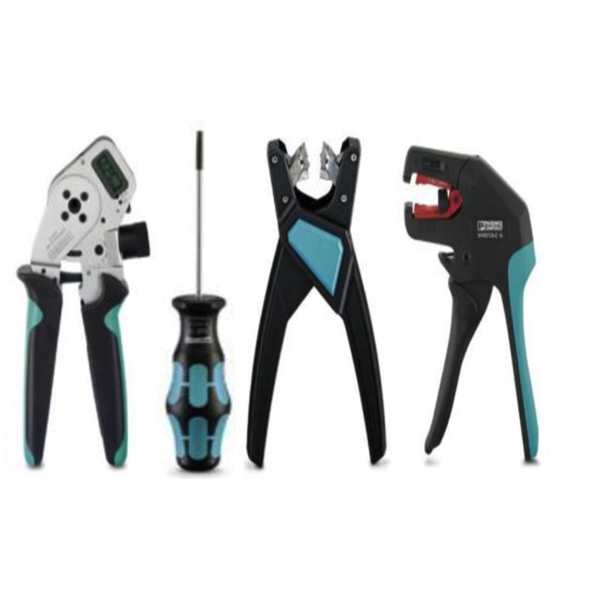Wire & Cable Tools

Wire and cable tools allow for the safe and effective removal of insulation from electrical cables and the secure attachment of connectors to cable ends. These tools are not only necessary but also must be used correctly in order to ensure the reliability of the connections they help make.
Cutting wires and cables can be a messy process. Different wires have different types of insulation, and often, stripping wire involves pulling on the insulation until it tears away. But using a good pair of cable cutters can make quick, clean work of this chore.
Heat guns and soldering irons securely fasten wires and cables together. They accomplish this by either using melted solder, which connects the metal parts, or by using heat shrink tubing, which covers the connections and ensures insulation and protection. Cable testers and continuity testers are then used to make sure that the connections are good; that is, that the cables are installed correctly and are fault-free.
More Information about Wire Tools and Cable Tools
Screwdrivers specifically designed for work in the electrical engineering field should have slim blades to access tight working spaces, insulation in both the handle and incorporated in the blade shaft to prevent electric shock and a magnetized tip to prevent dropped screws.
Cutting tools have been designed with extremely strong and hardened materials for cutting different types of cable and wire. This is necessary for burr-free cutting without crushing. Lever cutting tools have also been created to cut and stamp holes into standard DIN rails for customized applications.
Crimping tools are used to join materials by pressing them together and creating a crimp. One of the most common uses is attaching connectors to the end of wire heads to form an electrical union. Some crimpers are multi-purpose, including cutters, wire strippers and bending capabilities.
Stripping tools are designed to strip the insulating coating on wires to expose the copper wires underneath. Some stripping tools feature an adjustable limit stop to ensure accurate stripping lengths and have precise gauging to make sure that the braided shield and inner wires are not damaged.
FAQs
How important is it to find the correct tools needed for wire cutting?
Finding the correct tools for wire cutting is of paramount importance. Using the right tools ensures precision and accuracy, reducing the risk of mistakes or damaging the wire's integrity. Moreover, using the appropriate tools enhances safety, as improper tools can lead to accidents, short circuits, or other electrical hazards.
Industrial Wiring: Top 5 Most Important Tools
A multimeter.
A multimeter is a handheld tester used to measure electrical voltage, current, resistance, and other values. Multimeters come in digital and analog versions and are useful for everything from simple tests, like measuring battery voltage, to detecting faults and complex diagnostics. They are one of the tools preferred by electricians for troubleshooting electrical problems.
A very good wire stripper.
Many wire strippers are not built to a very high standard and can be very frustrating to use. Find a brand that makes a quality set and stick with them. Keep in mind that most wire strippers are designed to work with only a few different wire sizes.
Insulated screwdrivers.
Although the insulation does provide some protection against an electrical shock, it is not meant to be relied upon for safety. A good set of screwdrivers will make any electrical work and wiring easier. For more specialized work, such as working in a control panel, it is essential to find a good set of precision screwdrivers that are designed to be used with smaller terminals.
Electrical tape.
Whether pulling wire through conduit, securing wires together or covering exposed electrical terminals, electrical tape is incredibly useful and should always be in the tool bag when doing any kind of wiring.
Electrical Drawings (Schematics).
Just like with the other tools, having your electrical plans handy can be one of the most important tools you use.

